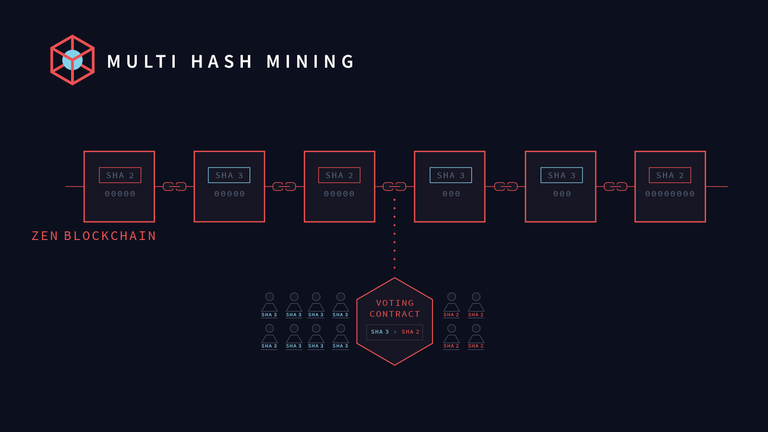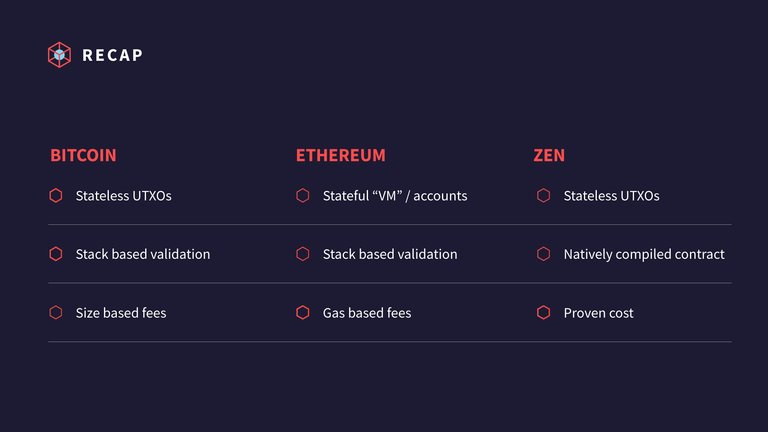Zen team wants to efficiently bring smart contract functionalities to the Bitcoin blockchain. They want to use sidechain technology, which consists in building a new blockchain pegged to the Bitcoin blockchain, in order to allow users to build and trade advanced financial assets in a decentralized manner. We already presented their project in our blog.
Today we are glad to interview Nathan Cook, CTO at Zen Protocol, about their project.
When do you think Zen will be live and which are the next steps before the launch?
The testnet alpha is up, and finishing the mainnet is going faster than expected. Our roadmap says Q2, 2018, but we hope to complete a successful and steady mainnet before then if possible. We have a couple of big features to add – multi-hash-mining in particular – and then we’ll transition to rigorously testing and hardening the client.
What about Multi-hash mining?
Multi-hash mining is our solution for reducing conflict between miners and users. Zen Protocol keeps a target ratio between different hash functions like Equihash, SHA-256^2, scrypt etc., then adjusts the difficulties to keep that ratio. Token holders can vote – on-chain – on what they want the ratio to be. The idea is that if miners see the ratio moving away from “their” hash functions, they’ll know that users don’t like something about what they’re doing, and they’ll have the incentive to change the way they behave.

Can you describe us the characteristics of Zen blockchain?
We’re targeting a block time of four or five minutes in our version 1 release. We’re looking into implementing SPECTRE (the protocol invented by Yonatan Sompolinsky, Yoad Lewenberg, and Aviv Zohar), which should allow for 20 second blocks quite easily, if it works well with the rest of our protocol.
We don’t have an explicit block size – we have a limit on the amount of computation a block can do instead. We’re pretty sure that initially there’ll be a bigger demand for computation than for storage on Zen Protocol, so we’re trying to manage that first. ZP is flexible enough that we can raise the computation limit by a soft-fork, so those sorts of limit aren’t as big a deal as in some other blockchains.
A few specifics about our platform: our contracts prove how many resources they cost, which lets us compile them and run them much faster. At the same time, they’re “pay as you go”, meaning that you only pay to keep them active for as long as you need to use them. And of course, they work smoothly with the basic kinds of object that the Zen Protocol has, such as tokens, permissions, and data from the Bitcoin blockchain.
Why do you think there is the need of creating another cryptocurrency in order to reach your goals?
The aim with Zen Protocol is to focus on financial products while connecting with Bitcoin as a monetary unit of account – that means that Bitcoin transactions don’t get more expensive to use because smart contracts are competing with them for resources. Existing platforms don’t offer the mix of security, speed and usability that we need. We’ve seen repeated smart contract failures over the past year or two, with costs in the hundreds of millions of dollars – and just knowing how important security is doesn’t seem to have stopped these problems.
We created a platform that makes it possible, even simple, to prove your smart contracts are correct. That proof is integrated right into the consensus layer of Zen Protocol. And some of that same technology lets us make contracts much faster, as well.
We know that the aim of Rootstock is similar to yours. Why Zen is better than Rootstock and which are the differences between the two projects?
Rootstock is pretty much “Ethereum with bitcoins” – it uses the EVM with a few additions. So it suffers from the same problems in making smart contracts secure – it’s just really, really hard to write a bug-free contract for the EVM. Zen Protocol is a completely new design -- the contracts are more secure and faster, and the blockchain supports financially relevant concepts, like “tokens” and “rights”, without developers having to re-implement them, as Ethereum and Rootstock require.
Rootstock also uses a single “federation” that controls all the bitcoins that get locked to the sidechain. The federation is just a group of people using multi-sig transactions – it’s completely centralized. By the way, the miners of the Rootstock chain are relying on this group as well, so it’s quite hard to see how the security of Rootstock’s blockchain depends on mining rather than the federation. Zen Protocol can allow for multiple competing federations, because our blockchain doesn’t rely on any trusted group to control the tokens that pay miners. ZP also supports Bitcoin upgrades which make sidechains more decentralized – something that Rootstock would need to hard-fork to implement.

What about the reserve for future (1.5 millions Zen tokens)?
The reserve will be a useful resource for offering incentives to new employees, and for rewarding independent developers and collaborators. For instance, someone working in the open source community and integrating Zen Protocol functionality would be a great candidate for an award from the reserve.
Are you facing regulatory challenges? What could be potential issues with regulators?
The regulatory environment has remained quite favourable for us. Our tokens license you to use the Protocol’s smart contract creation function, which is something that’s reasonably well understood in the software industry. We’re keeping up to date with any messages that local and international regulatory agencies are sending about blockchains more generally.
What is your opinion about regulation in decentralized finance?
Ironically, decentralization might make regulation more localized. Right now, the largest brokers, exchanges, and governments have such a strong influence on the financial system that their regulations are effectively transnational. A decentralized “base layer” for finance would leave regulators with their historic role of regulating commerce inside their own nations’ borders.
Thanks Nathan for answering to these questions.
Zen token sale will finish on the 30TH of December, for more informations about Zen Protocol visit their website.